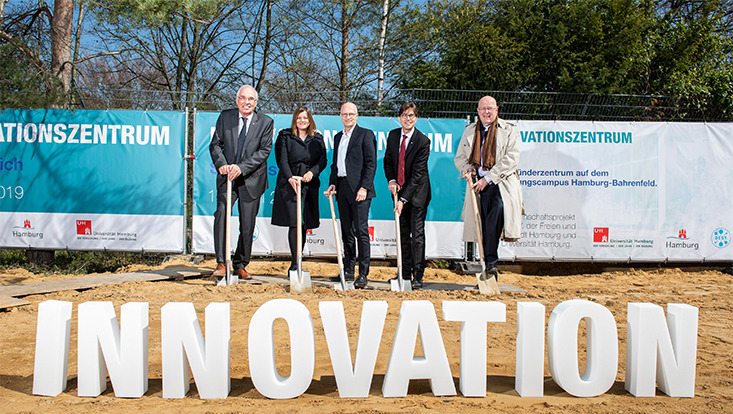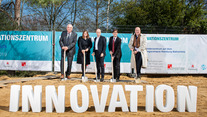15 April 2019
Breaking Ground for the Innovation Centre in Bahrenfeld

Photo: DESY/Daniel Reinhard.
With a symbolic breaking of the ground, Hamburg’s first mayor, Dr. Peter Tschentscher, the city’s second mayor and senator for science and research, Katharina Fegebank, the chair of the DESY Board of Directors, Prof. Dr. Dr. h. c. Helmut Dosch, the president of Universität Hamburg, Prof. Dr. Dr. h. c. Dieter Lenzen, and DESY’s chief technology officer, Dr. Arik Willner, launched construction works on the Innovation Centre.
The Innovation Centre on the research campus in Hamburg-Bahrenfeld is a joint DESY, Universität Hamburg, and Free and Hanseatic City of Hamburg project that will give a “face” to the high-tech hub Science City Bahrenfeld, to be located in Hamburg’s western suburbs. When completed in early 2021, it will provide around 2,600 m2 of office and laboratory space for start-ups working in fields covered on the research campus. The Innovation Centre will be operated by a limited liability corporation, the Innovationszentrum Forschungscampus Hamburg-Bahrenfeld GmbH, headed up by Arik Willner.
“Hamburg’s Senate is committed to helping research and innovative businesses find common ground and forge successful innovation chains. The Innovation Centre at DESY is one part of the future Science City Bahrenfeld and an important project in our science and research strategy. Great minds from start-ups and innovative businesses can work together here with researchers to develop new ideas,” said first mayor, Dr. Peter Tschentscher.
Helmut Dosch, chair of the DESY Board of Directors and chair of the stakeholders’ meeting of the limited liability corporation, added: “The DESY precinct is already home to several young businesses in the high-tech sector who are impatiently awaiting completion of this build. It is our aim to increase the number of start-ups with roots on the research campus, regardless of whether these originate from DESY, the University, or another institute.”
Prof. Dr. Dr. h. c. Dieter Lenzen, president of Universität Hamburg: “Research that nobody has heard of is no use to anyone. For this reason DESY and the University decided jointly to establish an innovation center together with the City of Hamburg that paves the way for us to pursue the entrepreneurial potential of research findings.”
The new Innovation Centre will be built next to the Center for Free-Electron Laser Science (CFEL) and will be accessible via the Luruper Chaussee. Offices, meeting rooms, labs, co-working spaces, and a small cafeteria are spread across roughly 2,600 m2 of floor space. The build will cost roughly 17.5 million euros, of which 14.2 million will be provided by the City of Hamburg. DESY will stem the remaining 3.3 million euros.
“The research ecosystem on the research campus in Bahrenfeld and the open scientific culture at home there provide an incredibly fruitful environment for innovation and the transfer of ideas and new findings from research and teaching to the commercial sector. With the Innovation Centre, we are helping to make these processes usable faster, not only for start-ups, but also for Hamburg and our society,” said Dr. Arik Willner, commenting on the importance of such a start-up center.
At the moment, young start-ups can make use of the office space, workshop and lab spaces in the Innovation Village, which opened in February. In addition to the Innovation Centre and DESY’s Innovation Village, DESY has been contracted by the German federal government with support from the City of Hamburg to plan an integrated technology and start-up center. It will focus on start-ups in the life sciences, biotechnology, nanotechnology, and new materials, and will provide the complex lab infrastructure including all safety aspects required for business endeavors in these fields.
The long-term vision foresees close networking between the scientific hub and industry, for whom the scientific excellence on campus—which includes two of Universität Hamburg’s clusters of excellence—is highly advantageous. Such a sturdy and well-networked system strengthens innovation in both research and in business and industry.

